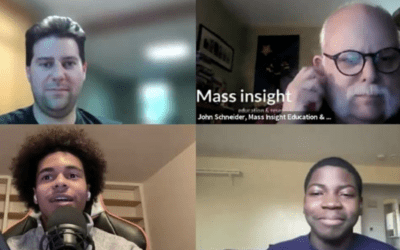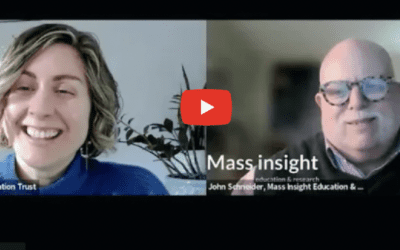What does the evidence say about how schools can improve the adolescent literacy crisis happening in our country? In this webinar, we explore the Institute of Education Sciences Reading Intervention Guide for Grades 4 through 9, found here, and diving into two of the...
The Importance of Computer Science Education
As part of STEM week, Massachusetts is promoting computer science (CS) education. Since our youth will never know a life without computers, we must teach them the skills and knowledge to understand the technology we use today so that they may go on to create the technology we will use tomorrow. We in the United States have always been innovation pioneers, and to continue this, we must start early to educate and engage our youth in computer science.
To inspire students to care about CS, I often reflect on what worked for me. Math was my favorite subject in high school, and I was lucky to have a great teacher who also happened to teach programming. He encouraged me to take programming courses during my junior and senior year. Those two years helped me develop my algorithmic thinking skills and learn how to read and write code with a purpose. My skills gave me a strong foundation for becoming a computer science programmer and software engineer. I was also fortunate to secure an internship at IBM, which led to a full-time job at Big Blue after graduation.
However, my youngest daughter lacked those CS experiences in her high school education. She arrived at college without a foundation in robotics or programming. She persisted, graduating with a degree in mechanical engineering, but too many students, especially women and students of color, are slipping through the cracks.
We need to make sure that the same pathways that I tread are open to today’s high school students. Here are four key lessons from my experience that we can apply to move computer science education forward:
- We must start early. Mathematical concepts, skills, and algorithms lay the groundwork for computer science thinking and learning. Offering opportunities for middle school students to become familiar with the computer science vocabulary, basic ideas and fundamentals is key. The earlier that students start learning about computer science, the more opportunities they have to recognize, inquire, and grow their digital literacy. The benefits of developing fundamental programming skills and thinking in middle school are game-changing. We can make this happen by providing professional development and ongoing content support to middle school teachers to prepare them to teach foundational skills and concepts.
- Strong pathways are essential. Students utilize, access, and employ technology in ways that are essential to their day to day life. They are users of a digital world, but do they know how and why technology works? Students benefit from seeing the connections between what they are learning and the real world. They need knowledgeable mentors to navigate them to a career in computer science or other related STEM fields. It is important that students are offered opportunities to gain a deep understanding of computer science, such as the new AP Computer Science Principals course that was introduced in 2016. This course can be a gateway to the AP Computer Science A course in java programming. Both of these courses provide a wide spectrum of CS education for students to access and develop a strong foundation for success in CS post high school. Advanced coursework can build students’ confidence in their computer science skills and give them a leg up in continuing their studies and making a career in the field.
- We need to provide extra support for underserved students and young women. When I took those programming courses in high school, I was the only female student in my class. If you went in to a computer science classroom today, the demographics likely would not look much different. Although young women are making gains, only about 27% of AP CS test takers in 2017 were female. We need to encourage young women to take these classes. If they are discouraged from participating, we will be missing out on so many bright female minds in the STEM workforce. The same goes for underserved students. Low income, Hispanic, and Black/African American students participate in AP classes at a much lower rate than their white peers. There are a variety of systemic barriers blocking the pathways to AP, such as pre-requisites, teacher recommendation requirements, or lack of counseling to encourage underserved students to take these courses. Supporting administration and student counselors in removing these barriers to advanced computer science education will, in turn, help all. We can and must open the doors to usher in a new set of diverse STEM workers.
- New computer science literacy standards will make a difference. There is a societal need for digital literacy: knowing, understanding, and communicating how and why our technological tools work. Students already have literacy with the use of technology, but their understanding of how technology was developed and what it takes to create, understand, and develop new platforms and tools and the effects they will have on society are only truly understood by few. We need to match up what we rely on in life to what we’re teaching students in high school. If students embrace computer science literacy standards just like we have in other subjects like English, our CS literacy will become second nature. Once they are fluent in the vocabulary of computer science, they are better able to understand the digital world. If set and implemented correctly, statewide computer science literacy standards can and will make a difference in our schools that will reverberate into higher education and the workforce.
While we celebrate STEM week, let’s make sure that we learn from the past and create exciting opportunities for students to pursue quality CS education.

Recent Posts
AP On-Track Framework Walkthrough — Webinar
Throughout the school year, AP students face crucial moments on their path to the AP exam. Mass Insight has developed a comprehensive roadmap to assist teachers in helping students build the academic and non-academic skills necessary for success in their AP classes....
AP Equity Self-Assessment Walkthrough – Webinar
Does your school monitor AP data through an equity lens? Is there an open enrollment policy for AP courses? How do you support students transitioning into AP? Watch our recent webinar below, where Mass Insight's team guide you through the AP Equity Self-Assessment...
You may also like
An Interview with Mass Insight AP Students and their Teacher
https://youtu.be/mQTeW8-sX40 We sat down with two Mass Insight AP STEM & English Program students, Ben and Chris-Ander, and their teacher, William Pellegrino, to hear about their educational journeys, their experiences in AP classes and as vocational students, and...
An Interview with Kristen Hengtgen of The Education Trust
https://youtu.be/1ZfxNShHJOU?si=d1a1GoVrgrDWT5Cu Kristen Hengtgen, Ph.D. is a senior analyst on The Education Trust's P-12 policy team and co-author of their new report, Increasing Access to Advanced Coursework in Massachusetts. In this interview, she joins Mass...
Creating the conditions for greater success of systemically disadvantaged students in AP: Next steps for the Massachusetts AP STEM & English program
Recently the New York Times published an article entitled, Why is the College Board Pushing to Expand Advanced Placement? The article focuses on an important issue: there’s been greater growth in AP participation for Black and Latino students and students living in...



